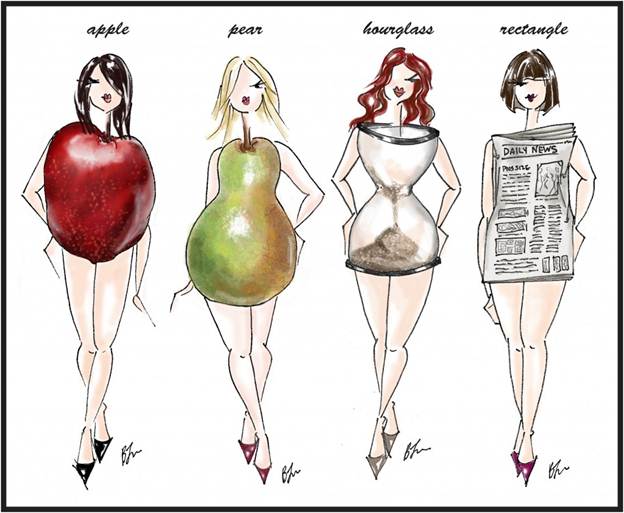Ever wondered how two people can eat in
exactly the same way, but have completely different figures? We uncover the
body-type mystery…
Can you pig out endlessly without gaining a
pound? Or does just a whiff of that chocolate cake wreak havoc with your
waistline? The reason our bodies respond differently to the food we eat is down
to genetics, just like hair or eye colour. But that doesn’t mean your efforts
to change your body are going to waste. It just means you need to find the
right fuel to your body type.

‘You can’t change your body shape or bone
structure,’ explains Joel Campbell, personal trainer, nutritionist and managing
director of Step Success (www.stepsuccess.com). ‘But things you can change include your weight, muscle mass and
body fat percentage.’ While ending legs of Gisele or the booty of Beyoncé, you can
achieve the well-proportioned, trim and toned body you’ve always dreamed of by
matching your diet to your body type.
Discover your body type

There are three body types, otherwise known
as somatotypes, devised by Dr. William H Sheldon in the 1940s. There is no
‘good’ or ‘bad’ type, but being aware of which category you fall into can help
you get results by eating correctly in accordance with your genetics, as well
as revealing why generic diets might not work for you. Have a look at the three
different types below and consider which category best describes your body.
Then read onto discover the secrets to transforming your figure.
Endomorphs:
hold onto fat, especially on the arms and legs, and often have a softer shape
with bones.
Mesomorphs:
are naturally athletic, and put on muscle and remain lean with ease.
Ectomorphs:
are naturally long and lean, don’t put on muscle or fat easily and have fast
metabolisms.
Find the right fuel

Endomorph
Endomorphs aren’t able to tolerate
carbohydrates as well as mesomorphs and ectomorphs. ‘This is because they are
more sensitive to insulin,’ says Joel. ‘So a diet with more protein and healthy
fats than carbohydrates is best.’ When choosing carbohydrates, it’s important
to go for wholegrain or brown versions when possible, such as brown rice.
‘Slow-absorbing carbohydrates that aren’t loaded with sugar are particularly
good, such as oatmeal, sweet potatoes and wholewheat bread,’ adds Joel. But
just because endomorphs hold onto more fat than other body types doesn’t mean
their diet should be devoid of fat. In fact, Joel recommends a diet consisting
of 40 per cent protein and 25 per cent carbohydrates for endomorphs.
Mesomorph
This body type may seem ideal, but that
doesn’t mean that mesomorphs are immune to weight gain. ‘Mesomorphs look
overweight easily if they eat too much,’ says Joel. ‘But they also tend to lose
weight easily with the appropriate adjustments.’ Because of their ability to
fall into either side of the weight spectrum, mesomorphs need to be consistent
in their eating. Protein is essential to maintain easily gained muscle mass:
Joel suggests a diet of 40 per cent carbohydrates, 30 per cent protein and 30
per cent healthy fats. ‘One pound of body weight requires at least 1.5 grams of
protein a day,’ advises Joe. ‘Eggs, whey protein and lean meats are best.’
Ectomorph
It can be difficult for ectomorphs to gain
mass due to their metabolisms. Carbs should make up 55 per cent of their diet,
followed by 25 per cent protein and 20 per cent healthy fats, according to
Joel. ‘Ectomorphs process carbohydrates very efficiently, which in turn burns
calories efficiently, explains Joel. ‘Increase intake in the form of brown
rice, granola and oatmeal and eat at least one gram of protein for every pound
you weigh per day.’ And just because ectomorphs burn calories efficiently
doesn’t mean they can get away with a bad diet. ‘Avoid junk food and don’t skip
meals,’ warns Joel. ‘Drink plenty of water, too, so that your muscles stay
hydrated.’
Slim down! – Match your work out
Dave Fletcher, founder of Odyssey Fat
Loss (www.theodysseyway.co.uk),
gives his top tips on how to adjust your exercise regime to suit your body
type.

‘Endomorphs: need to focus on
balancing oestrogen levels, as this causes fat storage in the thighs and bum,
which is common for this body type. Interval training (sprints and short bursts
of cardio followed by short periods of rest) is particularly effective.
Endomorphs often have a healthy level of lean muscle mass, so respond well to
low-repetition weight training, too. Try doing four to six reps of each
exercise and don’t do more than 15.’
Mesomorphs:
will respond best to a structured exercise plan. I’ve found that this body type
responds well to a programme that features plenty of weight training. Cardio
can be used to improve fitness levels, but it’s best to mix up the reps, sets
and rests with weights. Reps need to range from as low as three (with heavy
weights) to 15 (with lighter weights) for optimum results.’
Ectomorphs:
don’t usually need to lose weight – in fact, some often need to gain weight.
I’d suggest hypertrophy weight training (8-12 reps per exercise) to help build
up some lean muscle tissue. This doesn’t mean gaining overall weight though;
lean muscle mass will actually help you improve your overall body shape and
drop fat due to the improvements in your metabolic rate, which is often
achieved through this type of weight training.’